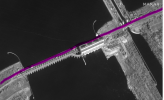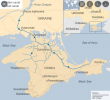In an
ISS explainer (opens in new tab) updated in May, NASA emphasized that the space station cannot be broken apart, physically speaking. "Current interdependencies between each segment of the station prevent the US orbital segment and Russian segment from operating independently," NASA said, adding that detachment would pose "major logistical and safety challenges" due to difficulties in controlling the spacecraft, the interdependence of the software and numerous connections between the segments.
How the ISS would shift operations after a Russian departure, if at all, is a complex question. Logsdon said that ISS propulsion maneuvers are directed by Moscow's mission control, which would make it difficult for other partners to take over from the ground control segment. A private American Cygnus spacecraft performed the
first U.S. boost of the space station last month, however, showing there might be an alternative path. That said, the spacecraft are not nearly as powerful as the current ISS propulsion system, Logsdon cautioned.
Who gets to use the facility in the event of a Russian withdrawal would also need to be worked out. "You can't take the other countries out," Logsdon said when asked if Russia would want exclusive use of its segment, absent the partnership. As for how the other countries might take over Russia's segment, Logsdon said that needs to be part of the discussions.
"Reacting to [the announcement] should be a collaborative thing," Logsdon said, alluding to the other ISS partners. He noted that, while Russia is one of the two principal ISS partners, it is "still a partner."













